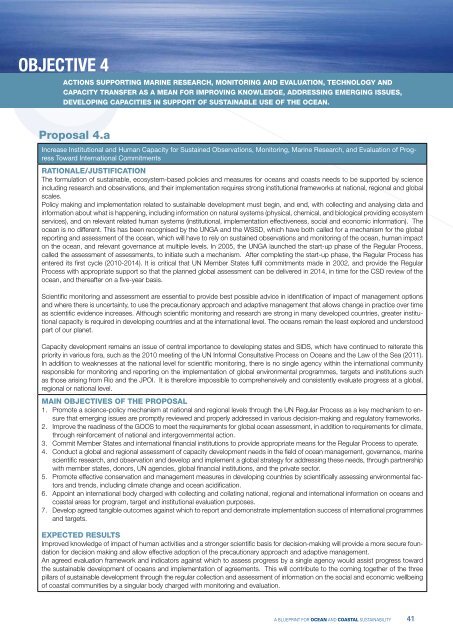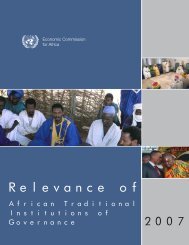Download Publication - Rio+20
Download Publication - Rio+20
Download Publication - Rio+20
Create successful ePaper yourself
Turn your PDF publications into a flip-book with our unique Google optimized e-Paper software.
OBJECTIVE 4<br />
ACTIONS SUPPORTING MARINE RESEARCH, MONITORING AND EVALUATION, TECHNOLOGY AND<br />
CAPACITY TRANSFER AS A MEAN FOR IMPROVING KNOWLEDGE, ADDRESSING EMERGING ISSUES,<br />
DEVELOPING CAPACITIES IN SUPPORT OF SUSTAINABLE USE OF THE OCEAN.<br />
Proposal 4.a<br />
Increase Institutional and Human Capacity for Sustained Observations, Monitoring, Marine Research, and Evaluation of Progress<br />
Toward International Commitments<br />
RATIONALE/JUSTIFICATION<br />
The formulation of sustainable, ecosystem-based policies and measures for oceans and coasts needs to be supported by science<br />
including research and observations, and their implementation requires strong institutional frameworks at national, regional and global<br />
scales.<br />
Policy making and implementation related to sustainable development must begin, and end, with collecting and analysing data and<br />
information about what is happening, including information on natural systems (physical, chemical, and biological providing ecosystem<br />
services), and on relevant related human systems (institutional, implementation effectiveness, social and economic information). The<br />
ocean is no different. This has been recognised by the UNGA and the WSSD, which have both called for a mechanism for the global<br />
reporting and assessment of the ocean, which will have to rely on sustained observations and monitoring of the ocean, human impact<br />
on the ocean, and relevant governance at multiple levels. In 2005, the UNGA launched the start-up phase of the Regular Process,<br />
called the assessment of assessments, to initiate such a mechanism. After completing the start-up phase, the Regular Process has<br />
entered its first cycle (2010-2014). It is critical that UN Member States fulfil commitments made in 2002, and provide the Regular<br />
Process with appropriate support so that the planned global assessment can be delivered in 2014, in time for the CSD review of the<br />
ocean, and thereafter on a five-year basis.<br />
Scientific monitoring and assessment are essential to provide best possible advice in identification of impact of management options<br />
and where there is uncertainty, to use the precautionary approach and adaptive management that allows change in practice over time<br />
as scientific evidence increases. Although scientific monitoring and research are strong in many developed countries, greater institutional<br />
capacity is required in developing countries and at the international level. The oceans remain the least explored and understood<br />
part of our planet.<br />
Capacity development remains an issue of central importance to developing states and SIDS, which have continued to reiterate this<br />
priority in various fora, such as the 2010 meeting of the UN Informal Consultative Process on Oceans and the Law of the Sea (2011).<br />
In addition to weaknesses at the national level for scientific monitoring, there is no single agency within the international community<br />
responsible for monitoring and reporting on the implementation of global environmental programmes, targets and institutions such<br />
as those arising from Rio and the JPOI. It is therefore impossible to comprehensively and consistently evaluate progress at a global,<br />
regional or national level.<br />
MAIN OBJECTIVES OF THE PROPOSAL<br />
1. Promote a science-policy mechanism at national and regional levels through the UN Regular Process as a key mechanism to ensure<br />
that emerging issues are promptly reviewed and properly addressed in various decision-making and regulatory frameworks.<br />
2. Improve the readiness of the GOOS to meet the requirements for global ocean assessment, in addition to requirements for climate,<br />
through reinforcement of national and intergovernmental action.<br />
3. Commit Member States and international financial institutions to provide appropriate means for the Regular Process to operate.<br />
4. Conduct a global and regional assessment of capacity development needs in the field of ocean management, governance, marine<br />
scientific research, and observation and develop and implement a global strategy for addressing these needs, through partnership<br />
with member states, donors, UN agencies, global financial institutions, and the private sector.<br />
5. Promote effective conservation and management measures in developing countries by scientifically assessing environmental factors<br />
and trends, including climate change and ocean acidification.<br />
6. Appoint an international body charged with collecting and collating national, regional and international information on oceans and<br />
coastal areas for program, target and institutional evaluation purposes.<br />
7. Develop agreed tangible outcomes against which to report and demonstrate implementation success of international programmes<br />
and targets.<br />
EXPECTED RESULTS<br />
Improved knowledge of impact of human activities and a stronger scientific basis for decision-making will provide a more secure foundation<br />
for decision making and allow effective adoption of the precautionary approach and adaptive management.<br />
An agreed evaluation framework and indicators against which to assess progress by a single agency would assist progress toward<br />
the sustainable development of oceans and implementation of agreements. This will contribute to the coming together of the three<br />
pillars of sustainable development through the regular collection and assessment of information on the social and economic wellbeing<br />
of coastal communities by a singular body charged with monitoring and evaluation.<br />
A BLUEPRINT FOR OCEAN AND COASTAL SUSTAINABILITY 41
















